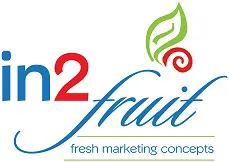 The table grape season is in its final days on Lac du Soleil in the Berg River, one of In2fruit’s table grape farms where the last Adora Seedless and Scarlotta Seedless grapes are being picked – and then packed right there in the vineyards, which is not usual practice in South Africa.
The table grape season is in its final days on Lac du Soleil in the Berg River, one of In2fruit’s table grape farms where the last Adora Seedless and Scarlotta Seedless grapes are being picked – and then packed right there in the vineyards, which is not usual practice in South Africa.
“The rain luckily came late in the season when we basically only had Scarlotta Seedless and Adora Seedless left to pack. We enclosed all of the Adora with plastic to prevent damage,” says Lac du Soleil’s manager Gerhard Olivier. “Fortunately our grapes sustained no damage with the rain.”
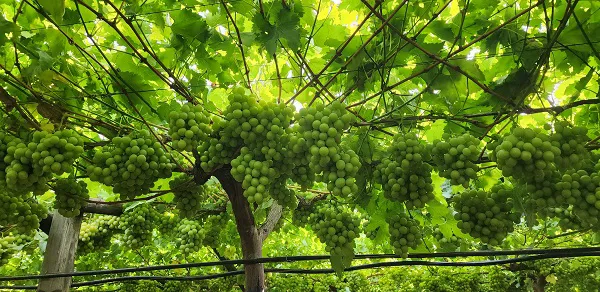 Autumncrisp grapes
Autumncrisp grapes
Lac du Soleil is a young grape farm, developed since 2016 on 60ha, with Adora Seedless, Sweet Celebration, Autumncrisp, Arra 15, Sweet Sapphire, Sweet Globe, Scarlotta Seedless and, until last year, Crimson.
They decided to take out the Crimson blocks over the past two years since its yield was lower than other varieties, Gerhard explains, and because the berries didn’t readily colour up, which might be related to their area being too warm.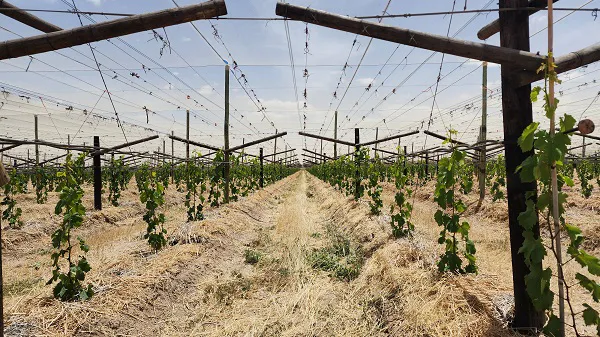 Four month-old vines on Lac du Soleil; all of the vineyards are covered
Four month-old vines on Lac du Soleil; all of the vineyards are covered
“The first block of Crimson was replaced in 2021 with 5ha Sweet Globe which had its first crop this year (3,600 cartons) and the second block was last year replaced with Autumncrisp which will be harvested next year.”
The farm, owned by In2fruit, will pack just over 420,000 cartons this season, with a peak of 446,000 cartons in 2020/21.
“Our production is very stable, everything above 7,000 to 8,000 cartons per hectare.”
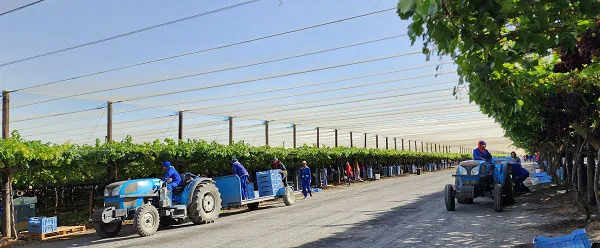
Field packing suits easy packing programmes
“From the beginning we packed in the field because it was a new farm without income, we had to look at the least expensive and best way of packing good quality grapes. Packing in the field still offers the advantage of the least amount of handling of the grapes,” he notes.
Plans were drawn up for a packhouse, but since it would only be in use for eight to ten weeks of the year, it didn’t make financial sense to go ahead with the construction.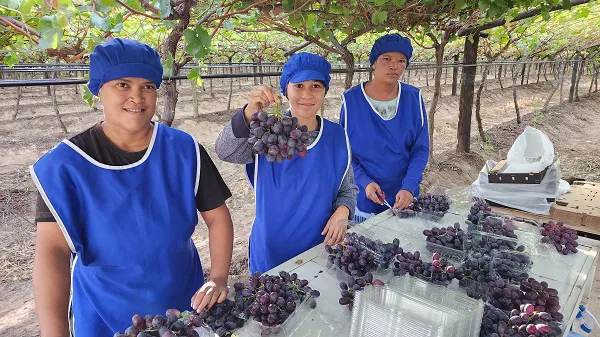
"In future there are plans to build a smaller packhouse to do specialised packing such as mixed punnets and special packaging programmes on the XXL grapes to add value to the production income, while still employing a smaller team in the field to pack the easier packaging programmes outside."
He continues: “For the vineyard packing we have four groups with 24 packing stations. Each station has three people associated with that specific table number. We aim to deliver one pallet of grapes per table, and after each table's target is reached, they get an incentive for every extra carton they pack. They fold their own cartons, cut the bunches and weigh them, and then pack it into various forms of packaging according to programmes and specification. When the carton is 100% complete it gets a sticker.”
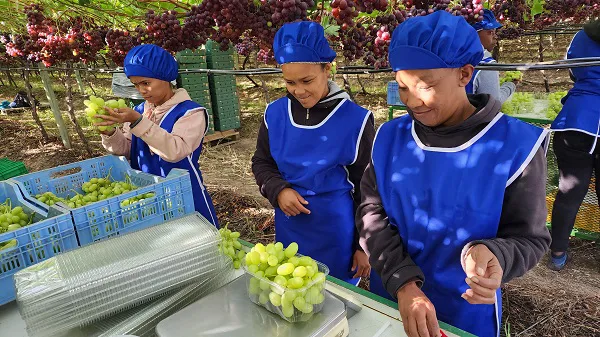 Weighing and packing Arra 15 grapes in the vineyard
Weighing and packing Arra 15 grapes in the vineyard
Each table has a number and a sticker with the corresponding number is put on each carton, so any problem can be traced back to a specific table.
Then it is driven to the palletizing area where the cartons are stacked and inspected before it goes into cooling.
"We also have our own quality assurance teams that are allocated to each group of packers. They use tablets to do inspections through the entire day in the field, and then also in the palletizing area where cartons are picked randomly and inspected. All that data is logged live and can be retrieved and any problems that may occur, can be sorted out immediately to ensure the quality standard is good and consistent."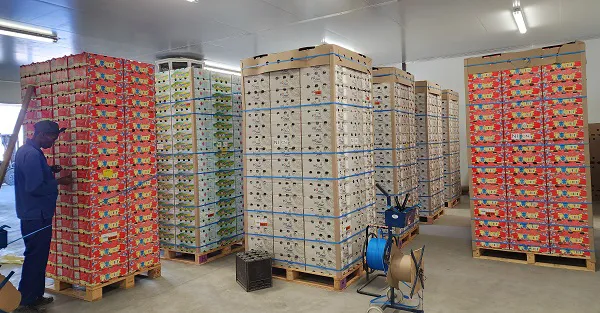 The palletizing room where cartons are inspected
The palletizing room where cartons are inspected
They built their own coldroom two years ago with five forced cooling tunnels that can each bring 21 pallets (one container) down to 0°C in about 16 to 18 hours depending on the temperature outside, plus then a large holding room where about 200 pallets can be kept.
"So we feel it adds more value to get your grapes into cooling as quickly as possible.”
He remarks that the delays in loading at Cape Town harbour had them running around a bit, looking for extra containers. "The logistical team did a great job and everything worked out and we never had to stop packing."
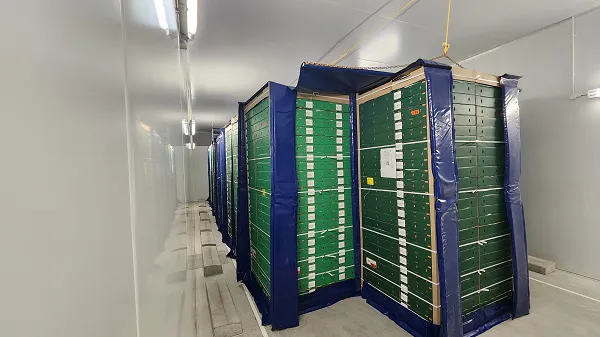 One of their five forced cooling tunnels
One of their five forced cooling tunnels
“We aim to cool down the grapes and place them in a container to the right destination within 48 hours after harvest. Only grapes for steri markets are taken away in refrigerated trucks to steri cold tunnels in specialised cold rooms.”
All of the blocks are under netting which has proven to be a great benefit regarding wind and bird damage.
“In our area birds can do a lot of damage, and when a few berries are pecked and start deteriorating, the infection spreads to surrounding berries, causing extra labour cost and a lower yield because of higher wastage – especially when you get rain on such grapes.”
Canaan bunch competition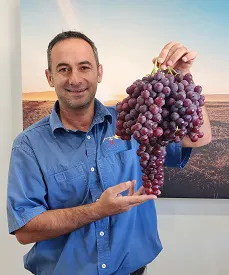 The South African Table Grape Industry launched a big bunch competition this year, named the Canaan bunch competition, to award a prize for the biggest and the heaviest bunch.
The South African Table Grape Industry launched a big bunch competition this year, named the Canaan bunch competition, to award a prize for the biggest and the heaviest bunch.
Right: Gerhard Olivier with Lac du Soleil's entry for the Canaan Competition: a 3.025kg bunch of Sweet Celebration
“I marked a few of the naturally longer bunches. Usually we trim the bunches to a particular length to produce a bunch of between 550g and 600g. On Sweet Celebration we usually leave between 60 and 70 berries, because its berry weight is 8 - 9g for Large, 9 - 12g for XL and 12 - 16g for XXL. So this is a bunch that we never shortened or trimmed, we left it to grow naturally.”
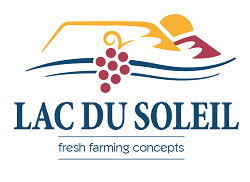 For more information:
For more information:
Gerhard Olivier
Lac du Soleil
gerhard@lacdusoleilfarm.co.za
https://in2fruit.co.za/lac-du-soleil/
